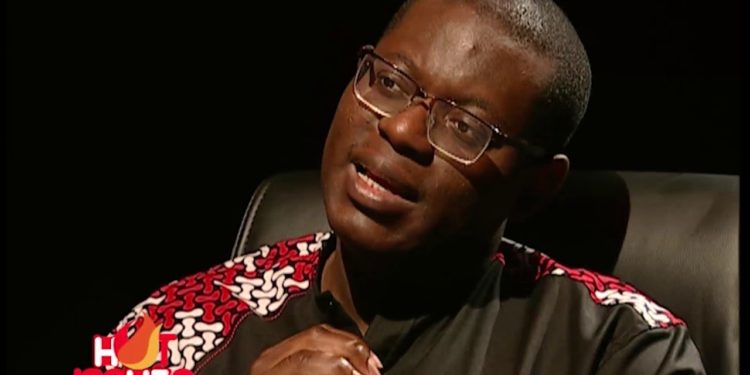Bright Simons Questions Viability of Pwalugu Dam Project
Bright Simons, Vice President of IMANI Ghana, has raised serious concerns over the government’s handling of the Pwalugu Dam project, questioning both its financial prudence and commercial viability.
In a post on February 2, 2025, Mr Simons challenged the government’s announcement of contract termination, arguing that PowerChina, the project’s contractor, had already vacated the site months prior, sold off materials, and effectively abandoned the project.
He contended that termination, in itself, was not the critical issue—rather, he called for clarity on financial obligations, funding strategies, and long-term feasibility.
Among his key concerns was whether the government intends to invoke the Stanbic Bank guarantee that backed its advance payment to PowerChina, and whether it has met the necessary conditions to do so. Without such recourse, he questioned whether the $12 million disbursed to the contractor is effectively unrecoverable.
Mr Simons also cast doubt on the project’s commercial rationale, particularly the electricity generation component. He argued that the proposed 60MW hydroelectric dam, with an additional 50MW solar plant, would struggle to turn a profit, especially in an industry where more capital-efficient power plants are already struggling with government arrears.
The irrigation component of the project also came under scrutiny with Mr Simons calling for the publication of a commercial feasibility study detailing expected water tariffs and demonstrating how local farmers would be able to absorb the costs associated with the infrastructure.
At the moment, financial sustainability of the dam project remains a significant concern. Initial estimates placed the project’s cost at over $900 million, raising questions about whether the government remains committed to funding the project at any cost.
With Ghana operating under an IMF-backed economic program, Mr Simons asked whether the new administration is prepared to divert funds from other agricultural initiatives to finance the dam.
Read Tweet Below:
Here is my prayer:
That a time will come when the middle-classes won’t allow a Minister to get away with “broad generalities” in Ghana. When he says, Ghana will terminate the Pwalugu Dam contract, we would ask the following:
1. PowerChina, the contractor on the project, has already departed the site many months ago.
2. The contractor has sold project materials and “de-mobilised”. The agreement has thus already been constructively terminated. Termination is hardly the big issue here.
3. What we want you to tell us are as follow: A. Do you intend to call upon the guarantee issued by Stanbic Bank based on which the advanced payment to PowerChina was made? B. Has the government discharged its obligations in a manner that should allow it to call on the guarantee? C. If not, is the ~$12 million paid to PowerChina gone forever?
4. Will the project scope be reviewed? No serious financier is going to give Ghana nearly $500 million to build a dam, whose primary commercialisation strategy is a 60 MW hydro dam with a 50 MW solar plant latched on as an afterthought.
5. Power sales from this dam shall be simply unprofitable. Especially in the current context where far more capital-effifient power plants are owed lots of money by the state in Ghana’s bankrupt electricity sector.
6. Are you going to review and publish the commercial feasibility plan for the irrigation component? Will you show us how local farmers can pay enough per cubic meter of water to offset the crazy costs of building the dam? What tariffs do you have in mind? When will see that paper?
7. Recall that an initial scoping even put the cost of the dam at over $900 million. This strongly implies likely budget overruns. Do we have a standing commitment to fund this project no matter how much it costs? Or have you found a way to bring down the capital costs to the $100m that would bring it closer to comparable projects that were not designed with Pwalugu’s social objectives in mind?
8. In many ways, this was a badly designed project that was never going to find funding. WHAT DIFFERENT STRATEGY are you proposing to make it financially viable?
9. You have re-committed to build the dam at all cost for political reasons. Given how tight money is in IMF-bailout Ghana, would you prioritise this dam over your other agric interventions? Which ones are you willing to slash if push comes to shove?
10. In short, we need a critical mass of citizens that won’t settle for the opaque governance we have in Ghana currently. Who will push for the “optimal transparency” needed to truly analyse the quality of government’s policy actions.
Would we ever see such a critical mass emerge? Second, this dam project has been viewed in classical ORAL fashion: somebody has taken Ghana’s $12m and we just want it back. But as I have explained above, it is a far more complex issue. Full transparency would help clarify how the country will save or recover money. It won’t be as simple as just “retrieving” what was paid.
Most ORAL situations look like this. Citizens who support ORAL must therefore learn to be interested in detail and push the new government to ditch the opaque model we have become accustomed to and embrace a new era of openness and analysis.
Without a change in how government operates, including far higher levels of transparency so that the careful reforms needed can be assessed before implementation, citizens are going to be very disappointed. For any real change to come, we, as citizens, especially those in the middle classes, must stop being satisfied with headline announcements and surface measures.








